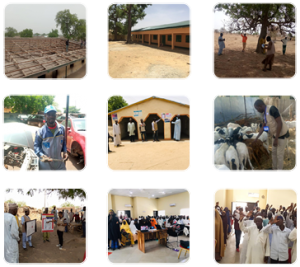From Conflict and Loss of Livelihood to Productive Agricultural Venture
“It was really a dark moment in time for me and my family but this vegetable farming activity with the help from FAO has given us a lifeline”
Sarah Bassi (left) with CCDRN staff during 3rd party monitoring visit to her farm
53 year old widow, Mrs. Sarah Bassi , lost her husband and means of livelihood to the Boko Haram conflict in Nigeria northeast community of Yalwa Bam in Hawul LGA of Borno state, leaving her with the burden of fending for ten children including seven other relatives affected by the crisis.
Traumatized by the death of her husband and disconnect from her means of livelihood and support structure, Sarah had little capital to afford for herself and her household. The difficulty was unimaginable.
“Sometimes we manage whatever we are able to get but most times, we go hungry and my children are unable to go to school because we had no money to pay for school fees.” She explains.
Sarah’s state of affairs is not peculiar or exclusive to her and her family alone. Since 2013, the three north-eastern States of Nigeria- Adamawa, Borno and Yobe have been destabilized by a huge humanitarian crisis caused by Boko Haram insurgency. A total of 1.9 million people fled their homes losing their livelihoods and 75 percent of them are currently hosted by the local communities, putting an additional burden on the already vulnerable households.
Food insecurity is prevalent in the region, with ridiculous food prices and lack of farming inputs restricting families’ access to food and revenue. As of December 2017, approximately 2.6 million people face life-threatening starvation in the northeast. Following the regaining of control and improvement of security of some areas, around 1 million people have returned towards their areas of origin and are trying to rebuild their lives and livelihoods with little or no support.
However, the big break and respite for Mrs. Sara and her household came via an intervention from the United Nations Food and Agricultural Organization UNFAO. Sarah is one of the several farmers that benefited from FAO’s dry season intervention, an extensive programme targeting IDPs, returnees and host communities through the provision of quality agriculture inputs. With the financial support from Belgium, CERF, ECHO, France, Germany, Norway, USA (OFDA), Switzerland and internal resources, FAO is supporting about 117,000 rural households (approximately 819 000 individuals) in dry season activities ranging from vegetable production, Rice production, Micro-gardening production, Cash and Livestock distribution.
FAO’s response to the food and livelihoods crisis in the Northeast states of Adamawa, Yobe and Borno has tremendously improved food security and source of revenue for once troubled Nigerian communities. Encouraged by the intervention, Mrs. Sara, who received improved vegetable seedlings went to work and her dry season farming activity now yields produce that brings greater prosperity and opportunity to her family
“My life has completely changed as a result of the help from FAO. Things were really difficult for me and my family previously. Boko Haram killed my husband who was the breadwinner ruined all our means of livelihood but now, with this dry season farming aid, I can now take good care of myself and my family members and even settle some school fees for my children. For instance, my son who has been out of school since this problem befell us, is now schooling at Federal Collage of Education Waka- Biu Biu, LGA Borno State, and I pay his school fee and that of others from proceeds of the vegetables I sell from the farm. I sold farm inputs like tomatoes, Onion, and Sorrels to buy food stuffs, settling children school dues, expanded my farming activity among other needs. It was really a dark moment in time for me and my family but this vegetable farming activity with the help from FAO has given us a lifeline”. Said Mrs. Sara.
This life changing experience is not limited to Mrs. Sarah. Following regaining of control and improvement of security in some areas, around a million people have returned to their area of origin and are trying to rebuild their lives. Some of these people just like Sarah, living in communities and IDP camps spread across the three most affected states of Adamawa, Yobe Borno were reached by FAO’s intervention.

Mr. Ibrahim Musa working on his Onion farm
Sharing his own experience, 32 year old Ibrahim Musa, from Yalwa Bam community of Hawul Local Government Area in Borno state, who also benefited from FAO dry season activity and now provides for seven relatives including his parents had also lost all his belongings to the Boko Haram insurgency.
“My life has completely changed since after the help I got from this people. I can now take care of myself and my family members and even settle some school fees of my younger ones. It was quite distressing when I lost all my belongings during Boko Haram attacks. My family now depends on me and I am able to take care of them from the proceeds of my farm thanks to FAO. I am now planning to construct my personal house, I have even molded some block of cement as you can see. From the sale of Onion, Amaranths & Roselle, I got almost N450, 000, which I am now planning to use for house construction. I will forever remain in their debt for this help”. Mr Musa said
